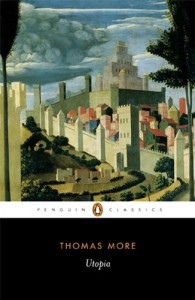More's Utopia

Its a bit surprising that I have not read Utopia. The work especially the first half of it, which recounts a dinner party and is only indirectly about the land of Utopia is quite charming. I was surprised about quite how breezy and easy to read it was. It reads almost like a satire, but in reverse with an endorsement of the society it presents and not its ridicule.
The book advocates religious liberty and communism. I think that is quite clear that the book takes these ideas very seriously. It is also strongly anti-materialistic and by advocating an even and minimal distribution of resources, it emphasizes that with the time saved the life of the mind and a concentration on morality can be emphasized. It is strongly humane (for the time) in what it advocates for punishment and is outwardly forgiving and understanding of the destitute who turn to a life of crime. It is a bit surprising that More advocates slavery, but his slavery is more like penal labour than true slavery.
The first half of the book dealing with the dinner party covers many of the same themes. The whole book was written at a time when More was wrestling with whether or not to begin a life of public service. Surprisingly, it appears to come out against it, because it claims that one cannot really make a difference unless there is fundamental change, however, this is more-or-less exactly when More decided to enter a life of public service. That is much of what is surprising about the book in fact. It is hard to square against More's life. While he did take a principled stand against Henry VIII and got killed for his trouble, and while he seemed not to care much for material possessions he certainly did burn heretics at the stake.
Despite the fact that More did not follow many of his ideals, and also despite the fact that the spartan living conditions and societal regulations would to me be stifling, it is really quite an interesting book and surprisingly entertaining.



